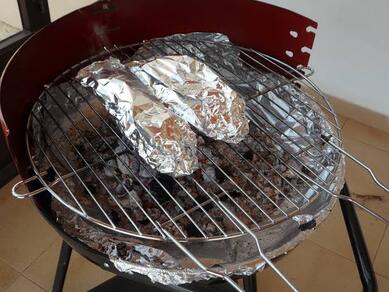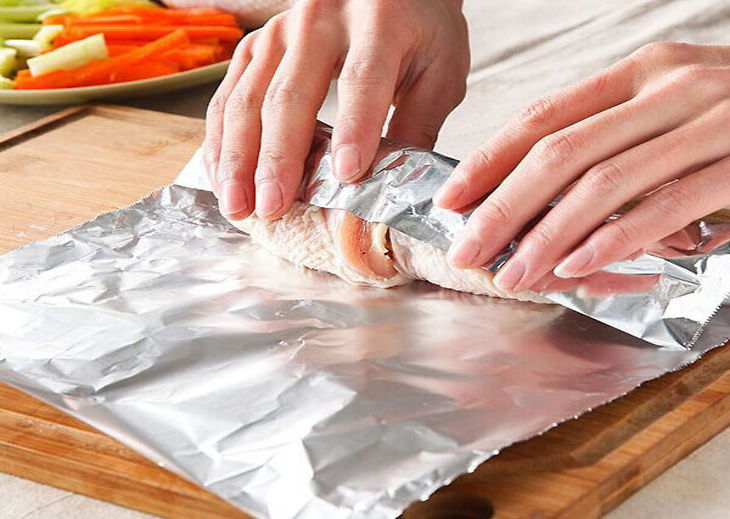 Grilling Using Aluminum Increases its Presence in the Food Grilling Using Aluminum Increases its Presence in the Food Aluminum is the most plentiful metal found in the Earth’s crust present in our environment in combination with other elements such as oxygen, silicon and fluorine. This makes us exposed to aluminum which is not dangerous but once the levels are higher than normal it becomes extremely hazardous to health. In reality, each of us ingest some amount of aluminum daily in our lives though this might sound crazy. But once you think about the conspicuous presence of aluminum in our daily life-in the form of foods, cosmetics, baking tools and our favourite aluminum foil we begin to realize the dominant presence of this metal in our life. Natural Presence of Aluminum It makes us happy when our mom packs our food in glittery aluminum foil rolling the phulkas or covering the sabji but have you ever thought about the fact that using such foils can cause aluminum to seep through into your food and increase your health risk? We have research showing that aluminum compounds are naturally present in water as a purifying agent, as an additive in processed foods where they could serve as an emulsifying agent or a food colorant, as a natural occurrence in our everyday foods such as fruits, vegetables, meat, fish, grains and dairy products and is omnipresent in commercially produced foods as they are dominated by food additives that might contain more aluminum than home-cooked foods. This metal is also found in baking trays and utensils, takeaway containers and foods such as radish, tea, spinach and mushrooms as they absorb a greater quantity of aluminum than other foods. We have research showing that the most common non-dietary intake of aluminum is in the form of deodorants and anti-perspirants and individuals might as well restrict the use of such products containing high aluminum levels and choose ones that have comparatively lower levels. Simple Tricks to Reduce Aluminum Use Every food doesn’t contain the same quantity of aluminum as the amount present differs based on various factors such as absorption (how fast the food absorbs aluminum), soil in which the food was grown, packaging (whether aluminum-based packaging material was used) and additives (whether the food contains additives that could contain a dominant share of aluminum). In reality, it might be a difficult task to single out those foods that are rich in aluminum but following a varied diet and using a variety of brands could minimize exposure to the metal. We have new results from German studies that mankind’s exposure to aluminum levels in foods has been decreasing but still our exposure levels are in unsafe territories. We can make simple modifications from our end to minimize exposure to aluminum-individuals can avoid preparing and storing food, especially acidic and salty ones in uncoated aluminum dishes/pots or aluminum foil. Cooking could be done in non-aluminum utensils such as glass or porcelain; aluminum foil for cooking purpose should be avoided; cook foods as much as possible at lower temperature; aluminum foil is used for wrapping foods such as veggies when grilling them but ensure to avoid using them for acidic foods such as tomatoes and rhubarb. Grilling is touted to be one of the healthiest ways to consume foods but there are also certain disadvantages to it, the list of which can be found at www.firsteatright.com. We have theories that dietary aluminum exists as a potent risk factor for Alzheimer’s disease as there have been high levels of aluminum found in the brains of people with Alzheimer’s. There are even threats of neurotoxicity and breast cancer risk. To avoid any of the risks of increased aluminum levels it is simply best to eat home-cooked foods and reduce consumption of processed foods. Comments are closed.
|
AVOID FRAUD. EAT SMART.+91 7846 800 800
AuthorDietitian & Nutritionist Dr. Nafeesa Imteyaz. Archives
July 2024
Categories
All
Dr. Nafeesa's Blog @blogspot |
- Home
- Written Testimonials
- Consult
- Clinics
- Blogs
-
Diet & Nutrition
- Diabetes Reversal
- IVF IUI not needed for PCOS PCOD Infertility
-
Medical Nutrition
>
-
Disease & Conditions
>
- Infertility | PCOS
- Diabetes Mellitus
- Cholesterol
- Hypothyroid
- Kidney Problems
- Hypertension
- Cardiovascular Diseases
- Liver Diseases
- Gastro intestinal disorder
- Cancer
- Metabolic Disorders
- Orthopedic Disorders
- Eating Disorders
- Dietary Recall
- Weight Record Filled By Clients
- Online Payment Transaction Details
- Online Clients Weight Check Form
- Our Program Package Service Charges
- Weight Record 2017 Clients
- Measurements sent by Clients
- Terms & Conditions Of Payment
- Thanks. Your Form is Submitted
- Video Testimonials
- Lifestyle & Wellness
- Lifestyle & Wellness Blog
- Allergy & Intolerance
- Weight Loss / Gain
- Weight Loss / Slimming Blog
-
Disease & Conditions
>
- Life Cycle Nutrition >
- Sports Nutrition >
- Integrity in Nutrition
- Knowledge Centre
© COPYRIGHT 2022. ALL RIGHTS RESERVED. FRST HEALTHCARE PVT LTD.
Dr. Nafeesa Imteyaz of First Eat Right clinic, is the Best Dietitian Nutritionist in Bangalore. Best Dietitian Nutritionist in Pune. Best Dietitian Nutritionist in Hyderabad. Best Dietitian Nutritionist in Chennai. Best Dietitian Nutritionist in Mumbai. Best Dietitian Nutritionist in Delhi. Best Dietitian Nutritionist in Kolkata.


